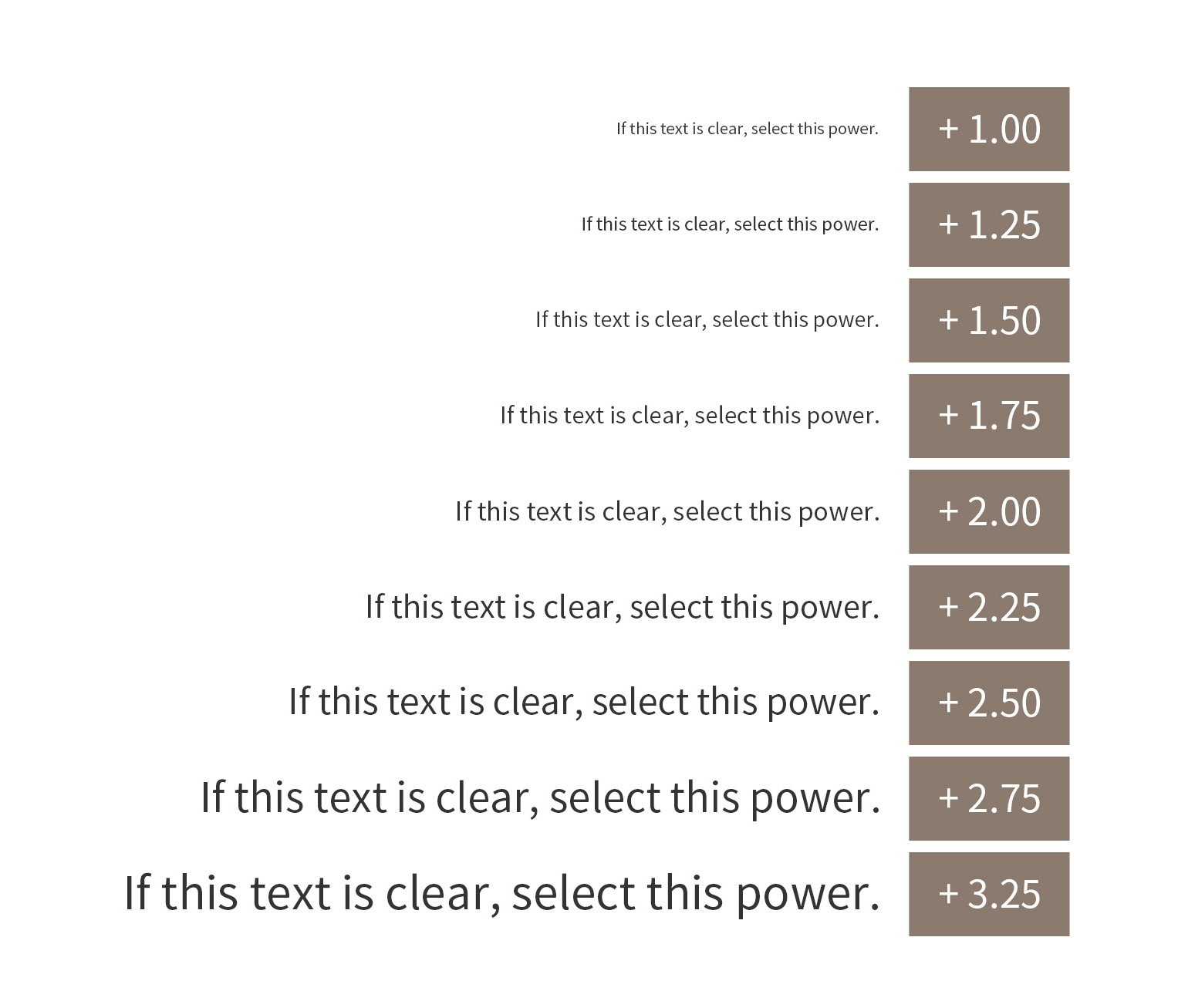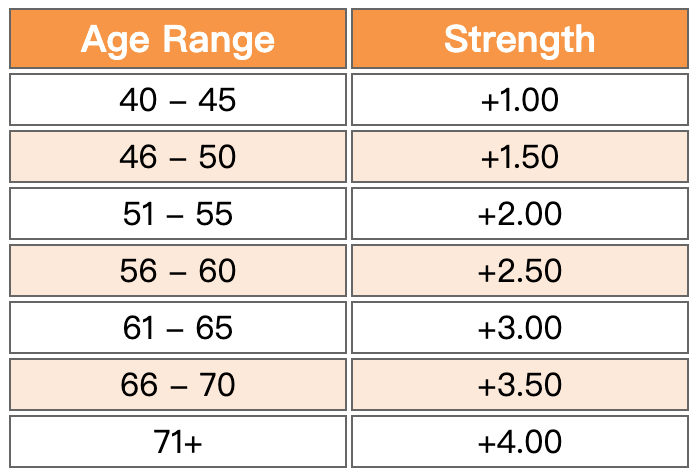- GlassesShop By FrameShop By StyleFeatured
Wondering how to know what reading glasses I need? Finding the right reading glasses strength is crucial for preventing eye strain and seeing clearly. Instead of guessing, use our guide to accurately determine your reader strength.












Struggling to find the right reading glasses strength? Discover the answers here. Explore our comprehensive guide including reading glasses strength chart and by age. Get clear vision now!
After a certain age (probably around 40), you may find that you need some visual assistance while reading. This is a completely normal phenomenon! And then you need to find a suitable pair of reading glasses for yourself to solve this problem. But readers aren’t for everyone, you need to figure out exactly what strength of reading glasses you need.
Because if the reading glasses with the power you choose that isn’t the right one match for your eyes, you may experience some unwanted side effects, such as: not being able to read clearly, feeling headaches, eyes are easily tired, etc.
You need readers that you can see clearly when you put them on and open a book to read, not readers that make words look a little off or even gives you a headache.
Diopter test charts have rows of words ranging in text size that correspond to reading glasses' strengths. If you’re purchasing reading glasses online, you can also use a printable diopter chart.
Step 1: Put the printed sheet 14″ away, and attempt to read the top line without reading glasses.
Step 2: Continue down the chart until you find a line you can read clearly without your glasses on – this is the diopter (power/magnification) you need.
Tip: Make sure to remove your glasses when you use the diopter test. If you have different vision needs in your right and left eye, simply cover up one eye at a time to test each eye individually.

Diopters are the units of measurement that determine the strength of your reading glasses. These are also the units in your standard vision prescription, they tell you how much refractive power is present in the lens. The higher the number, the more powerful your glassesc will be.
Reading glasses always have a + symbol before their power, and they come in a wide range of strengths. (Our store diopters from +1.00 to +4.00.) There is a lot of variability within this range, so you want to make sure you choose the right magnification that works for your eyes.
The diopter level that you need will depend on your specific needs. However, we have a reading glasses power chart available in EFE that can recommend the strength of reading glasses you need based on your age.

If you're around the age of 40 - 45, you may need +1.00 reading glasses.
Of course, this chart is only for your shopping guide. Choosing the right reading glasses for you depends not only on your age, but also on your actual needs.
While age is a general guideline for determining reading glass strength, everyone is different and it can vary on a case-by-case basis. Optometrists have therefore made some generalizations about the strength of reading glasses needed at certain ages (this may differ if you already have a prescription).
• Ages 25–30: Recommended power +0.50 to +0.75
• Ages 30–40: Recommended power +1.00
• Ages 40–44: Recommended power +0.75 to +1.00
• Ages 45–49: Recommended power +1.00 to +1.50
• Ages 50–54: Recommended power +1.50 to +2.00
• Ages 55–59: Recommended power +2.00 to +2.25
• Ages 61–65: Recommended power +2.25 to +2.50
• Ages 60–70: Recommended power +2.5 to +3
• Ages 70–75: Recommended power +3 to +3.5
• Ages 80–100+: Recommended power +3.5 to +4
In short, if you have to go to the store to try on different pairs of readers, don’t buy the first pair that seems good enough. You should bring a book or some printed paper, and try on multiple pairs of glasses to get a better idea of what kind of power you need. Or you can also find your right reading glasses strength by contacting an optometrist to test it for you.
If you want to buy suitable reading glasses online, there are nearly 400 kinds of reading glasses for you to choose from on our website. You can choose any three pairs, but only the price of one pair!
If you want to know what reading glasses strength is best for you, you should always consult an optometrist. By examining your eyes, they'll be able to eliminate the guesswork of trying on different over-the-counter readers—and make it possible for you to order higher-quality reading glasses online.
Sometimes you'll find reading glasses higher than 3 diopters in strength. The higher the number in diopters, the higher the strength. So, +1.25 reading glasses would be less strong than +1.50 reading glasses, which would be less strong than +1.75 reading glasses.
The average strength of reading glasses is between +0.75 and +2.50 diopters, but the strength you need depends on your age and your eyes' natural lenses. As people age, their vision declines and they need stronger reading glasses to see up close. Optometrists generally recommend the following strengths based on age:
• Ages 40–49: +0.75–+1.50 diopters
• Ages 50–59: +1.50–+2.25 diopters
• Ages 61 and up: +2.25–+2.75 diopters
To calculate your reader strength, take your SPH and add the ADD. For example, if the SPH is +1.00 and the ADD is +1.75 for the right eye, the strength of the reader lenses would be +2.75 for that eye.
The average strength of reading glasses is between +0.75 and +2.50 diopters, with diopters being the unit lens strength is measured in and indicated by the + symbol.
When choosing reading glasses for a computer, you can consider things like the lens type, frame style, and size. Recommend purchasing computer reading glasses with a power that is half of your standard reading power.
The strength of reading glasses you need after cataract surgery depends on several factors, including your vision needs, overall eye health, and the type of lens you receive:
• IOL type
If you receive a monofocal IOL, which is the standard lens used in many cataract surgeries, you'll likely need reading glasses for close-up tasks. However, if you get a Toric IOL to correct astigmatism, you might be able to see clearly at a distance without glasses.
• IVision needs
Some people prefer to wear glasses for long periods of reading or other activities that require near vision. For example, nearsighted patients may need reading glasses while waiting for cataract surgery in their other eye.
• IOther factors
Your current prescription and whether you have astigmatism can also affect the strength of reading glasses you need.
Guide on How to Choose the Right Power Using an Age Chart
Guide Online Reading Glasses Test Chart for Your Prescription
A Guide to Choose the Perfect Reading Glasses with a Strength Chart Breakdown
Reading Glasses Strength Diopter Chart: Find Your Perfect Diopter

